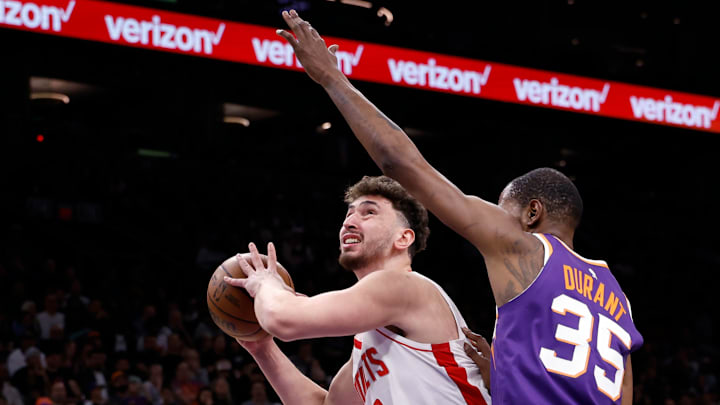The Houston Rockets have made a habit of controlling another team's future.
For some time, they were tethered to the Brooklyn Nets. The Rockets owned a bundle of their picks spanning far into the future. This summer, they sent those picks back to the Nets in exchange for a larger volume of Phoenix Suns selections.
Plenty of fans questioned Rafael Stone's logic. To be sure, it wasn't a perfect trade. The Nets could have sent the Rockets the rights to Cooper Flagg. That wasn't going to happen with the contending Suns' selection.
...Are you sure about that?
Rockets could land another lottery pick
If the season ended today, the Nets would have a 9% chance of landing Flagg, where the Suns' pick's odds sit at 4.5%.
That's a meaningful difference. It's not a sizeable enough gap to negate the volume of picks the Rockets now own. Houston will take a 4.5% smaller chance of landing Flagg if it means having an extra future first and two extra swaps.
It's also worth noting that the Nets allegedly (and likely) would not have moved Mikal Bridges if they weren't getting their own picks back. They'd likely be somewhere in Phoenix's current range in the lottery odds if they'd kept their roster whole.
You may counter that Stone should have kept the worse team's pick in an exceedingly strong draft. Fair. There's nuance in the strategy employed here. You don't have to love Stone's decision, but you'd be shortsighted to deny that Stone has the Rockets in an advantageous situation.
Rockets have Suns backed into a corner
Rockets fans are getting used to this dynamic.
The Suns can't rebuild without their picks. This is an aging team. They're above the second apron, so they can't aggregate contracts in a trade. The only player with a sizeable enough deal to move the needle is Bradley Beal, and he happens to have a no-trade clause. Improvement is virtually impossible.
Beal may waive the clause. He still boasts one of the worst contracts in the NBA. Would the Heat trade Jimmy Butler for Beal and the Suns' 2031 unprotected first? Pat Riley would likely keep Butler in South Beach beyond the deadline.
Let's say that the deal goes through. It will surely reduce those Flagg odds - probably to 0. What's next? Butler is 35. The Rockets own Suns picks up to 2029. The Suns would only be delaying the inevitable.
When the inevitable comes, the Rockets would be in a prime position to land one of Devin Booker or Kevin Durant.
Is that the right move?
Rockets have a myriad of options
So much analysis of this dynamic is circumstantial.
If the Suns blow it up this year, perhaps the Rockets could justify Durant. He remains one of the purest scorers in the Association. That said, at 36, giving up any of the team's "core seven" for him could prove a mistake.
Booker is a more natural target. The Rockets have enjoyed tremendous success in 2024-25 despite subpar guard play. Although, Jalen Green's play is improving lately, and Booker is having a down year. If they each continue trending in their current direction, the juice may not be worth the squeeze in a Booker deal.
What if the Rockets don't trade for either?
Stone could keep it simple and continue drafting with the picks. If you're up on the 2029 class, congratulations - you're a psychopath. Still, talented players come into the league every year. If the Rockets are contending, having a pipeline of affordable talent could be vital.
It's also possible that they'll land a franchise-altering talent with one of these picks.
Alternatively, Stone could kick the can again. Suppose that in a few years, a team finds themselves in the same position Phoenix was in when they acquired Durant. They're close to contention, and ready to push all-in. Could the Rockets flip the Suns picks for their future picks if Stone is anticipating a Suns-like collapse? The Rockets' future is bright, but it's exceedingly unclear:
At least they control it.
